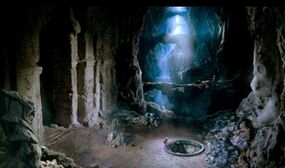Krop Tor
Krop Tor was a planet that orbited K37 Gem 5, a black hole. It took its name from the Scripture of the Veltino. "Krop Tor" meant "the Bitter Pill". According to that legend, a demon — K37 Gem 5 — had attempted to swallow it, but, finding it poison, had to spit it back out.
Astronomical data
Krop Tor was a barren planet with no atmosphere. It had earthquakes and volcanoes. Though in stable orbit, it shook from the gravitational effects of the black hole it orbited and frequently the destroyed remnants of various solar systems torn apart by the gravity of the black hole passed above the planet. (TV: The Impossible Planet/The Satan Pit) A vanished civilisation, the Disciples of the Light, had left traces of their existence, including a script left on pottery shards. (WC: Tardisode 8, TV: The Impossible Planet) Ten miles beneath the surface, the Tenth Doctor and Ida Scott from the Walker Expedition found a ruined underground city, (TV: The Impossible Planet) and a pit leading into darkness, which served as a prison for the Beast. (TV: The Satan Pit)
Krop Tor evinced anomalies. It emitted a gravity funnel into space, preventing it from falling into the black hole. It maintained orbit by an unknown power source, generating an inverted, self-extrapolating reflex of 66 every six seconds. Even the Doctor could not provide a scientific explanation for the power source, which came from ten miles beneath the surface of the planet. (TV: The Impossible Planet)
History
K37 Gem 5 and Krop Tor were set up by the Disciples of the Light to imprison the Beast. The Beast was trapped within Krop Tor and a power source was implanted to keep the planet from falling into K37 Gem 5. If the Beast tried to escape, the power source would fail and the planet would be dragged into the black hole and destroy the Beast before it could escape. (TV: The Satan Pit)
Around the 42nd century, the Second Great and Bountiful Human Empire learned of Krop Tor. The first mission to investigate it, the Galis Expedition, brought back some pottery and a notebook. (WC: Tardisode 8) The next mission, the Walker Expedition, was sent to drill into the planet and get the power source that kept it stable. They thought they could harness the energy produced on the planet which kept it orbiting the black hole to power their empire.
The Tenth Doctor and Rose came to Krop Tor by happenstance.
Eventually, the centre of the planet was reached and the Beast awoke. (TV: The Impossible Planet) It tried to escape, possessing Toby Zed and attacking the rest of the expedition with the possessed Ood. The Beast planned to let them escape on their rocket, allowing his mind in Toby to escape as well. The Doctor confronted the Beast and shut off the power source, pulling Krop Tor towards K37 Gem 5. The Beast then takes over Toby’s mind, and boasts that he cannot ever be killed. Rose picks up a bolt gun and uses it to shatter the window of the rocket. She then unbuckles Toby’s seat belt, ejecting him and the Beast out of the rocket and into the black hole, destroying the Beast’s mind. The Doctor is able to escape Krop Tor using the TARDIS, rescuing Ida Scott as well, but he did not have time to rescue the Ood, and such the Ood were killed when Krop Tor finally fell into the black hole, destroying the Beast’s physical body as well. (TV: The Satan Pit, PROSE: The Doctors [+]Loading...{"page":"12","1":"The Doctors (feature)"})
Behind the scenes
The location of Krop Tor was never given onscreen, though the Doctor says the black hole was out in the depths of the universe. He also stated that if you travelled 500 years in a certain direction, you would reach Earth. Unless the Doctor's comment was suggesting that the speed would be slower than that of the Walker Expedition's spacecraft, this seems to contradict the fact that the crew expected to return to Earth in less than one human lifetime, without cryogenics or other means of surviving centuries-long journeys.

